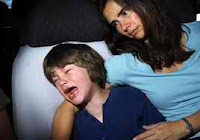Dealing with Destructive Behavior in Children with Asperger's and HFA

"I need some immediate ideas about how to deal with my son's behavior problems. He has Asperger syndrome (high functioning), ADHD and ODD. His behavior is completely out of control and I am at my wits end. Please help! He also has a lot of problems at school. His favorite thing to do when he's upset is to throw and break things." There are no easy, quick fixes to reduce or eliminate severe behavioral issues in children with Asperger’s (AS) or High-Functioning Autism (HFA) (e.g., self-injury, aggressiveness, meltdowns, tantrums, destructiveness, etc.). However, I have a few suggestions that may not require a tremendous amount of time and effort to implement. Let’s look at a few… 1. One reason for behavioral issues may be difficulties in receptive language. Kids on the autism spectrum often have poor auditory processing skills. As a result, they often don’t understand what others are saying to them; they hear the words, but they don’t understand what the





